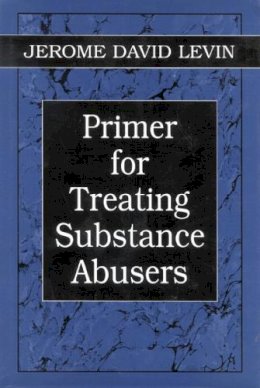
Stock image for illustration purposes only - book cover, edition or condition may vary.
Primer for Treating Substance Abusers
Jerome D. Levin
€ 156.23
FREE Delivery in Ireland
Description for Primer for Treating Substance Abusers
Hardback. Dr. Levin outlines the treatment of chemical and other addictions such as compulsive gambling, compulsive sexuality, and codependency. Series: Library of Substance Abuse Treatment. Num Pages: 294 pages, references, index. BIC Classification: JFFH1; JMAL; JMT; MMJT; MMZR. Category: (G) General (US: Trade). Dimension: 236 x 163 x 29. Weight in Grams: 612.
Is abstinence necessary? What is the role of hypnosis? What is the pink cloud? This encyclopedic primer, written in an easy question-and-answer format, contains everything a clinician needs to know about substance abuse and addiction. Dr. Jerome David Levin outlines the treatment of chemical and other addictions such as compulsive gambling, compulsive sexuality, and codependency. He covers the full complexity of substance abuse diagnosis and treatment with a biopsychosocial approach and multimodal interventions, ranging from detoxification and rehabilitation programs to cognitive and behavioral treatments, self-help groups, and individual and family therapy. A clear, comprehensive book that presents an integrated picture of a complex phenomenon, this primer can be profitably read either straight through or as a reference text.
Product Details
Format
Hardback
Publication date
1999
Publisher
Jason Aronson Inc. Publishers United States
Number of pages
294
Condition
New
Series
Library of Substance Abuse Treatment
Number of Pages
294
Place of Publication
Northvale NJ, United States
ISBN
9780765700780
SKU
V9780765700780
Shipping Time
Usually ships in 15 to 20 working days
Ref
99-15
About Jerome D. Levin
Jerome David Levin, Ph.D., is a faculty member of the Humanities Department at the New School for Social Research as well as Director of the New School's Alcoholism and Substance Abuse Counselor Training Program. He is also Adjunct Associate Professor of Social Science at New York University. Dr. Levin is the author of Treatment of Alcoholism and Other Addictions: A Self-Psychology Approach, Recovery from Alcoholism: Beyond Your Wildest Dreams, Introduction to Alcoholism Counseling: A Bio-Psycho-Social Approach, Slings and Arrows: Narcissistic Injury and Its Treatment, Theories of the Self, The Clinton Syndrome: The Tragedy of Sexual Addiction, and most recently, Couple and Family Therapy of Addiction. He is co-editor with Ronna H. Weiss of The Dynamics and Treatment of Alcoholism: Essential Papers. Dr. Levin conducts a private practice in psychodynamic psychotherapy in New York City and Long Island.
Reviews for Primer for Treating Substance Abusers
This is an original and valuable book for mental health or substance abuse trainees interested in learning how to treat addiction. Dr. Levin employs the ingenious technique of supplying basic questions and then answering them in a thoughtful way. In adopting this approach, he has created a well-organized and approachable text that is a pleasure to read.
Marc Galantar, New York University School of Medicine, M.D., professor of psychiatry, New York University School of Medicine Dr. Jerome Levin's Primer for Treating Substance Abusers is as basic as it gets. At the same time, it is erudite and comprehensive in reviewing each class of abused drug and the etiologies and treatments of substance use disorders. His scholarly focus on theory is eloquently complemented by compelling case examples. Through his review of theory and his cases, Dr. Levin reveals the complex nature of addictive vulnerability, its tragic consequences when unchecked, and the considerable hope for transformation and recovery when it is properly understood and treated. Beyond the practical and erudite aspects of his primer, Dr. Levin's clarify of writing, the many questions raised (and answered), and keen sense of humor make this book very engaging and readable.
Edward J. Khantzian, M.D., Harvard Medical School; Tewksbury Hospital This very readable book provides mental health professionals with a wonderfully comprehensive orientation toward addiction treatment. The author offers his extensive experience, rich case material, and summarizes and critiques the claims of leading thinkers and practitioners. He highlights fine points of clinical practice and describes broad strategies and tactics of treatment. He also explains diagnosis, etiology, theory, and research about addiction in historical and cultural contexts, and demonstrates how these contexts, if ignored, can thwart treatment efforts. In these ways this book is a detailed road map for mental health professionals who must guide addicts through obstacles, dead ends, and traps that mark the path to recovery.
Sanford Weinstein, Ed.D., C.S.W., New York University
Marc Galantar, New York University School of Medicine, M.D., professor of psychiatry, New York University School of Medicine Dr. Jerome Levin's Primer for Treating Substance Abusers is as basic as it gets. At the same time, it is erudite and comprehensive in reviewing each class of abused drug and the etiologies and treatments of substance use disorders. His scholarly focus on theory is eloquently complemented by compelling case examples. Through his review of theory and his cases, Dr. Levin reveals the complex nature of addictive vulnerability, its tragic consequences when unchecked, and the considerable hope for transformation and recovery when it is properly understood and treated. Beyond the practical and erudite aspects of his primer, Dr. Levin's clarify of writing, the many questions raised (and answered), and keen sense of humor make this book very engaging and readable.
Edward J. Khantzian, M.D., Harvard Medical School; Tewksbury Hospital This very readable book provides mental health professionals with a wonderfully comprehensive orientation toward addiction treatment. The author offers his extensive experience, rich case material, and summarizes and critiques the claims of leading thinkers and practitioners. He highlights fine points of clinical practice and describes broad strategies and tactics of treatment. He also explains diagnosis, etiology, theory, and research about addiction in historical and cultural contexts, and demonstrates how these contexts, if ignored, can thwart treatment efforts. In these ways this book is a detailed road map for mental health professionals who must guide addicts through obstacles, dead ends, and traps that mark the path to recovery.
Sanford Weinstein, Ed.D., C.S.W., New York University
